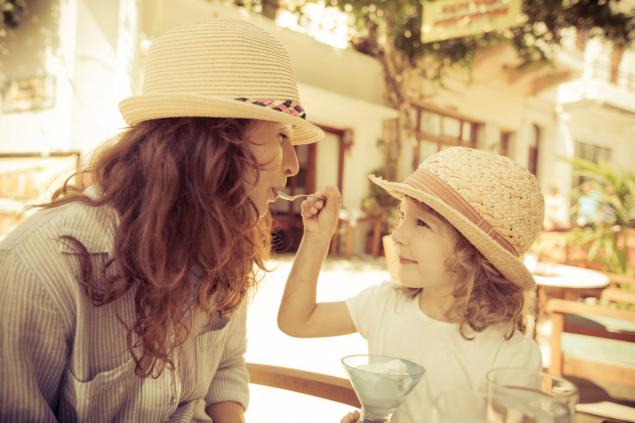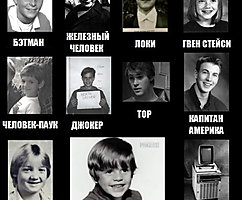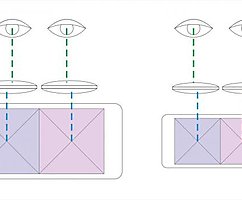Responsiveness and desire to help people laid down in the birth
 Bashny.Net
Bashny.Net
Young children kinder vzroslyhPrinyato assume that young children are selfish, but as it turned out, Caroline Williams, they are often kinder adults.

Last Christmas I went with his young son to the theater. The show titled "Antarctica" was for 4-7-year-olds, and from the point of view of an adult where it was a bit surreal. Actors scattered around the "snow" from pieces of white paper, and he fell to the stage. Then they dressed in costumes seals fastened fake mustache and started to skate in this paper "snow", shouting something to each other.
I still thought it was strange, but the sur nothing compared to what happened after the show. When the actors left the stage and the audience was about to leave, from somewhere in the depths of the stage quietly left the woman with a small box. Without saying a word, and anyone not looking, she put the box on the floor and quietly stepped back.
At the age of 14 months, the children spontaneously help a person, that something is struggling or just looks concerned, even if they for this we have to give up what they are doing at that moment h4> A fraction of a second every child in the room rushed forward, scored handfuls of paper "snow" and put it in a box.
Our closest evolutionary relatives, chimpanzees, to help each other without any benefit for himself, suggesting that altruism is caused biologically h4> This idea came Uornekenu in the head when he was a young graduate student -entuziastom, and at first his more experienced colleagues thought that it did not work.

Last Christmas I went with his young son to the theater. The show titled "Antarctica" was for 4-7-year-olds, and from the point of view of an adult where it was a bit surreal. Actors scattered around the "snow" from pieces of white paper, and he fell to the stage. Then they dressed in costumes seals fastened fake mustache and started to skate in this paper "snow", shouting something to each other.
I still thought it was strange, but the sur nothing compared to what happened after the show. When the actors left the stage and the audience was about to leave, from somewhere in the depths of the stage quietly left the woman with a small box. Without saying a word, and anyone not looking, she put the box on the floor and quietly stepped back.
At the age of 14 months, the children spontaneously help a person, that something is struggling or just looks concerned, even if they for this we have to give up what they are doing at that moment h4> A fraction of a second every child in the room rushed forward, scored handfuls of paper "snow" and put it in a box.
No one asked them to do so. Between them there was no dispute about who and what missed. They just did. Their parents looked at each other in bewilderment. Because it was eerie, like children someone hypnotized.
So what happened? Can a woman with a box used a trick to influence the will of the child? Or the little kids just want to be useful?
The latter explanation may seem less likely, because melenkie children are not known for the dedication, and, at least in my family, cleaning the house is always done under duress.

But according to Harvard psychologist Felix Uornekena in the latter explanation certainly makes sense. He studied "helping behavior" in children aged 14 months to 5 years, and came to the conclusion that young children tend to be so useful that adults behind them simply can not keep up.
"There is a suggestion that we should teach children to be more altruistic, since the very beginning they are selfish. But now research shows that the whole story is much more complicated, "- says the Uorneken.
In fact, studying children have much to teach us when it comes to the origins of human kindness.
Group pomoschOkazanie aid - it is the main component of what psychologists call "pro-social behavior." This component holds social groups together. In adults it is associated with the concepts of morality and social norms, which is why it is very difficult to answer the question of whether someone is truly selfless.
That is why the Uorneken decided to study children: a better start to learn them all at an early age while they are still too dependent on social norms. And if mutual - the basis of human psychology, the need to study their first year of life, as soon as they become physically able to help others.
Our closest evolutionary relatives, chimpanzees, to help each other without any benefit for himself, suggesting that altruism is caused biologically h4> This idea came Uornekenu in the head when he was a young graduate student -entuziastom, and at first his more experienced colleagues thought that it did not work.
"I thought: if I accidentally dropped something, whether children served me this thing? Colleagues suggested that children will just keep it. Anyway, I tried. And guess what happened? They helped! "- He recalls.
Uorneken found that at the age of 14 months, the children spontaneously help a person, who is struggling with something or just looks concerned, even if they have to give up to do what they are doing at this moment. In two years, they can help a person who does not even know that needs help - simply because they noticed someone had dropped something, for example.
Interestingly, the children do not seem to think much about what they get for their assistance. In the experiments, 20-month-old children received the award for helping others, but this did not make them more useful to children in the control group that did not receive assistance for anything (although children from the first group became less useful when they picked up the award).
Other studies suggest that the mutual underlies human nature. Our closest evolutionary relatives, chimpanzees, help each other, without any benefit for himself, suggesting that altruism is caused biologically.
The study of German scientists from the Institute for Evolutionary Anthropology Max Planck showed that the emotional reaction to help someone 2-year-old child, estimated by the size of his pupil, the same as in the moments when someone helps him. All of this suggests that caring for others is inscribed in us at the genetic level.

Bad povorotPosle all this begs the question: what is happening to our beautiful and useful aspirations when we get older? In the end, all the adults have seen what happens in the theater, but none of them had not even thought to help children. Why?

At first it may seem that we are losing the ability to care for others, getting older. But a psychologist at New York University, Martin Hoffman, who for over 30 years engaged in the study of empathy, is not so sure.
"There is no evidence that adults are less capable of empathy than kids," - he says. Instead, it seems that we have a better handle what is happening and decide what to do. That is, in the end, we still want to help, but do "mental gymnastics", trying to weigh all the options.
Uorneken considers that probably this behavior is for our own good, since "good for our survival. Because there is nothing good about that all the time to give, give and give. After all, no one suggests that human nature is always selfless ».
In 1970, psychologists Bibb Latane and John Darley to quantify the decision making process. They described what is now known as the "bystander effect" explains why large groups of strangers are so few people who are willing to help others.
According to Darley and Bibb, we are taking a decision on the aid goes through several stages. Please notice that someone needs our help, and then realize that it's an emergency, and then realize the responsibility for assisting and finally decide what to do. And only then begin to act. The more people around, the less responsibility feels every single person.
"But little children do not go through all these complicated arguments. They see the situation and just go ahead and do something, "- says the Uorneken.
But it is very long. A recent study conducted by Maria Plotner of the Institute for Evolutionary Anthropology Max Planck showed that children begin to experience the "bystander effect" is already five years old.
Most children in the theater was five years old and more, and they are, in theory, should have become victims of the "bystander effect." So it remains to assume that the children still were mesmerized by a lady with a box.
Regardless of what caused this behavior of children, it seems, is not an isolated case.
Actor James Stenhaus remembers a similar incident in which year-old girl broke a very tense scene in the play, to help deal with the situation. In one scene the actor threw a whole bucket of balls for the ping-pong table in his colleague actress, and then sat down in frustration, clutching his hands behind his head.
This performance they played four years, and all this time the audience behaved quietly and calmly watched as the balls fly across the stage, until one little girl decided not to help, balls flown apart folded back into the bucket.
Obviously, the reasons for both children and adults feel obliged to do something nice surrounding, very complex and still not fully understood. The only thing we do know is that children come into the world "programmed" kindness, but after some time, the "program" disappears.
via www.bbc.com/future/story/20150407-are-you-nicer-than-a-child
Tags
See also
8 facts about sexual oddities greats
This is the best recipe for happiness
As the desire to bring people to a healthy lifestyle stress and depression
Biologist Jared diamond: Why do we like sex and why men
Motivation is not for the faint of heart: 10 reasons to quit your job
The formula for success. How mathematics helps people to live
Andrey Maksimov: the Choice of vocation is not a choice of income, but the choice of a happy or unhappy life
We overestimate the relevance of morality: how the recognition of its imperfection will make the world a better place
How to help humanity after death




















